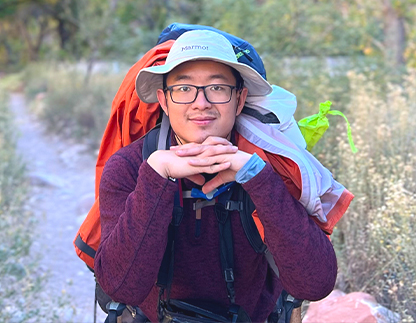We can’t change what happened in the past, but we can decide what will happen in the future.”
Ruoxi Zhu
PhD Candidate in the Department of Electrical Engineering

Ruoxi Zhu is a PhD candidate in the Department of Electrical Engineering in the McCormick School of Engineering. His research focuses on light-atom interactions. Ruoxi also serves as the event leader on the board of Northwestern’s Graduate International Student Association (G-ISA).
How would you describe your research and/or work to a non-academic audience?
My research focuses on the ability to make ultra-precise measurements by using light-atom interactions. Right now, I’m building a device to measure velocity and rotation rate more accurately, which is a critical part in navigation systems when GPS signals are lost. Furthermore, the concepts I used in this device can be applied in fundamental research, like searching for dark matter, where supreme accuracy and stability are both required.
Tell us what inspired your research and/or work.
I am fascinated by the magic of the universe but also want to make some stuff, instead of sitting in a room programming all day long. That wish takes me here.
What is a mistake you have learned from in your career?
Don’t be paranoid! Be brave and give it a try. At the early stage of my research, I was too focused on some trivial details in my experiment. I always worried that the setup wouldn’t work and I would waste my time. But then I learned that failure is not an option. I should always try it first. If something doesn’t work, then go ahead and find out why. That’s the life of a PhD and the essence of research.
What is the biggest potential impact or implication of your work?
My work will help humans understand the universe better. The universe has been there for hundreds of millions of years and human history is at most thousands of years. The quest of knowing the universe is also a quest for ourselves. The more we know about how the universe is composing and working, the better we can make ourselves ready for the exploration. Maybe one day, we can finally prove the existence of dark matter and even make an engine powered by it, which would enable us to travel between galaxies.
How do you unwind after a long day?
I usually work out at the gym or go swimming. Then I go back to call my mom and partner for a relaxing chat.
What books are on your bedside table?
It’s Our Revolution by Bernie Sanders. I’m interested in political philosophy, and I have read some articles about Mr. Sanders back in my country. So, when I bumped into this bestseller, I decided to bring it home.
What inspires you?
Passion, love and courage.
What did you originally want to be when you grew up?
I wanted to be an astronomer, who can look at the dark sky every day and find extraterrestrial life.
What advice would you give your younger self or someone considering a similar path?
Be brave and don’t regret any choices you make. We can’t change what happened in the past, but we can decide what will happen in the future.
What are you most proud of in your career to date?
For the first time, I’m independently working on an experiment where I can build my own system and potentially make an applicable device out of it. Meanwhile, I’m deeply involved in student organizations and student affairs. I have organized lots of events for international students and all of them are very popular with hundreds of attendees. When I first came to the U.S., I had a difficult time talking with others and understanding what they said. But now I can initiate a chat without any problem. Even though sometimes I still get lost in English, I’m brave enough to express my opinion and be inclusive to different standings
Publish Date: December 19, 2023
If you know a graduate student, postdoctoral fellow, graduate faculty member, staff member, or a member of our TGS alumni population who would make a great candidate for our TGS Spotlight Series, please complete this brief TGS Spotlight Series Nomination Form.